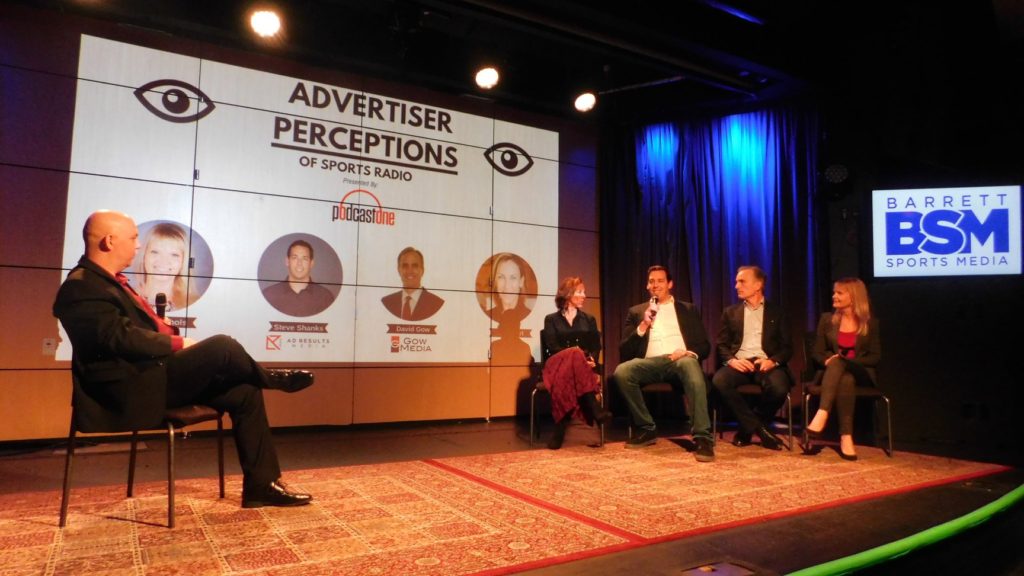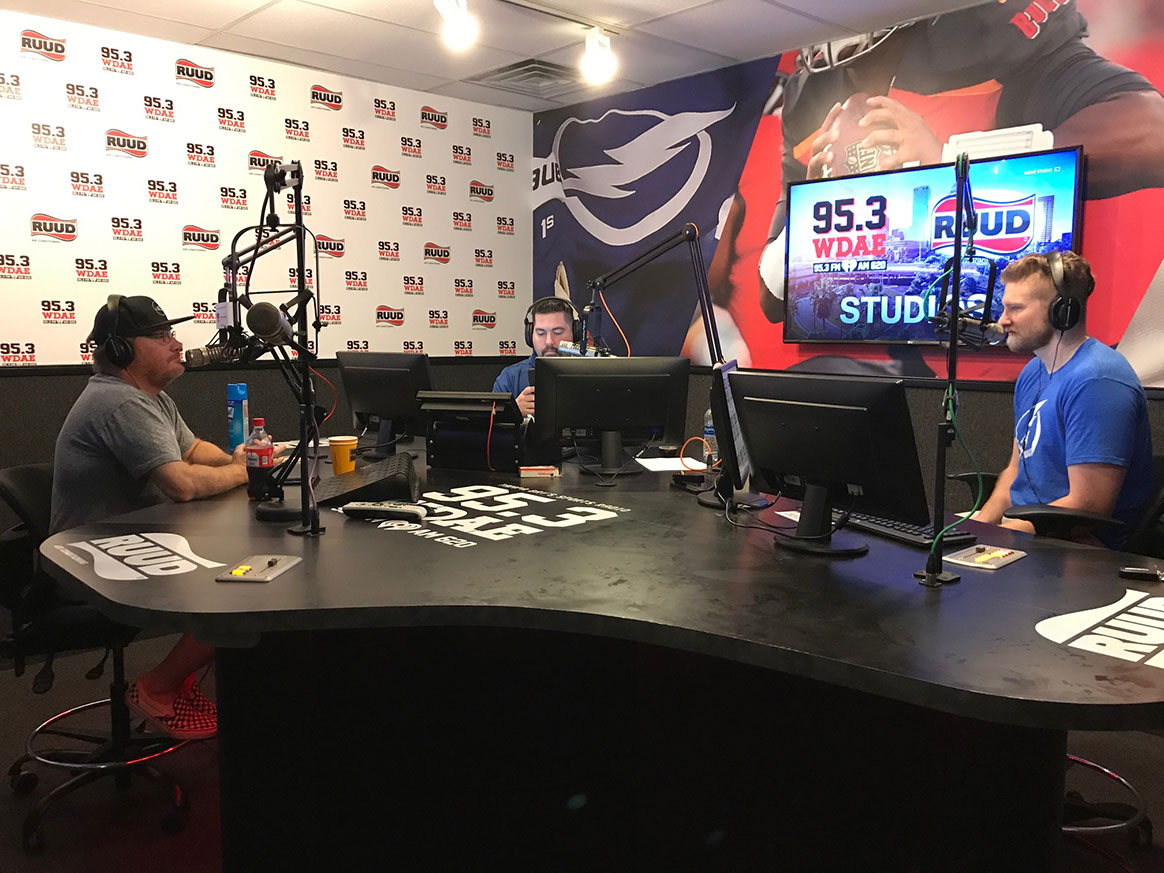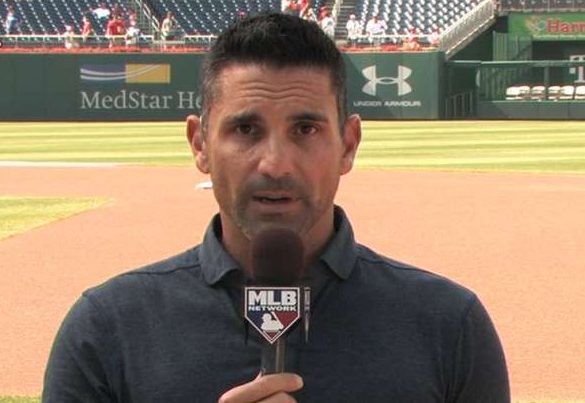The landscape of sports radio and radio in general, for that matter, is constantly changing. This presents challenges for sports programmers around the country. With more ways to listen to content, you have to keep up or risk getting left behind.
With the Barrett Sports Media Summit in New York just around the corner, we’re featuring one of those sports programmers who will be in attendance. I caught up with John Mamola, the program director at WDAE in Tampa. Mamola and I discussed the Summit and how his station is facing those challenges.

Andy Masur: What are you looking forward to in the upcoming BSM Summit?
John Mamola: Just bouncing off the one I attended in Chicago, I love hearing from guys like Mitch (Rosen, PD 670 The Score in Chicago) and on a local level Mike Thomas (new GM of ESPN 1000). Just to gather their thoughts, I mean, you know, the best of the best is who I love hearing from. Especially from a local perspective. At the same time, you know, guys like Justin Craig, Scott Shapiro, who deal with syndication and affiliates, the relationships between the local affiliates and the national syndicators. Also, how they can potentially craft their programming to a local audience if at all. That’s my biggest challenge here in Tampa. We run Dan Patrick but how can we make him as much Tampa as possible? Hearing ideas and general discussions with those guys on how exactly they do that is invaluable for me. Hearing guys chime in on their own and things that they’ve tried on a local level for national syndication.
I’m looking forward to hearing things on Nielsen and ratings and percentage of the ear and that kind of stuff. How podcasting is becoming more and more a prevalent medium for people as opposed to the actual radio in the car. Anyone who’s really associated with that, that’s definitely of interest to me.
AM: You mentioned a few names, are those the guys that you’re most looking forward to hearing from at the BSM Summit?
JM: The bigger names on the local level, so guys like Mike Thomas and Mitch, and you know, Chernoff. I’m really interested to hear from him because he didn’t attend the one in Chicago. Anyone that deals with how people are consuming sports radio is of interest to me.
AM: What did you think of the first one you attended in Chicago?
JM: It was great! I’m just happy to see that the first one was a good kickoff, starting point, for the second one. Looks like the one in LA went extremely well. I’m happy to see a third one in New York.

I also like how Jason has taken these to major markets, Chicago, New York and L.A. I’d be interested to see where the fourth one goes, if he continues to do this and I hope he does. Maybe something a little more south, maybe not so top 20, maybe something top 40 just to kind of get a different spin on things, maybe a different feel on things from the people in that local market.
AM: So how long have you been at this? Give us some of your background.
JM: I didn’t have any notion of getiting involved in radio, until i found out that my pre-pharmacy credits didn’t transfer to the university of Illinois-chicago. Not happy about that. I watched Private Parts and thought “hey that looks like a fun career!”, so I looked up the Illinois Media School, took a tour the very next day and that was the start. I got my internship at The Score, worked my way up to overnight board op, then a part time board op on the weekends, and then full-time in the mornings. Then WDAE came calling. There was an opening, I thought, “okay, well I have a kid on the way, and I just got married, so I have to start thinking career as opposed to a job.” I figured something as a programmer would be a little more stable, if there even is such a thing as stable. I’ve been here since April of ’11 and the PD since about three years ago.
AM: What are some of the challenges facing local sports radio and national sports talk?
JM: The biggest challenge for me, is I don’t truly have a head-to-head competitor. It’s not a bad thing but, at the same time, it’s not a good thing. I like competition. I’m from Chicago, where it’s MVP (ESPN 1000) and The Score going head to head. It’s a little bit of a different way of approaching things and a different way of competing. It’s all about winning the ears of sports fans in the market.
We haven’t had a real true winner (sports franchise) down here in quite a while. Fans become complacent, there are beaches to go to, and a lot of fun things to do in Tampa. That’s why attendance at Rays games has been last since well before I was born probably. The Bucs have struggled, and even though the Lightning are the hottest ticket in town, they’ve had 230 straight sell-outs, the amount of platforms they’re on here locally is not near the same amount that the Bucs and Rays have.
It’s a different sports market when you come from such a die-hard city where people are raised and their dads were raised to root for certain teams. You just don’t have that down here. It’s really interesting sometimes the balancing of hyper local with Rays, Bucs, Bolts as opposed to national stuff with Patriots, Giants and Bears and all that kind of stuff. We try to do, not necessarily a 50/50 split between local and national, we try to do, probably 70/30. just because we know that there are a lot of people down here that are just not from here.
Nationally, I think the biggest challenge for every radio station around the country is “how do I become even more prevalent in every single area where people consume media?”. Younger audiences are going to YouTube, Twitch and they’re going to different streaming outlets, you know Spotify, people listen to podcasts on Spotify. How can we continue to expand our spider web to where we’re just as prevalent with a Spotify listener or a Pandora listener? How can I get a videocast on a Twitch channel where I can reach new listeners or new viewers? I think that’s the single biggest challenge because the days of just turning on the radio in the car or having a home radio where you just listen, is becoming extinct. How do I become easier to get to right away for that person who has an hour and a half to two hour drive, instead of having to search for me.
/cdn.vox-cdn.com/uploads/chorus_image/image/65210501/1173214778.jpg.0.jpg)
AM: So then how do you brand your station, knowing how important the on-air product is, but also realizing the other platforms need your attention?
JM: We still are content first. My main focus is, “are we providing the best content we can at that given time?”. Are we playing the hits as much as we can? That’s first and foremost, because if you’re not doing that, then they’re not going to come find you anyway. Multiple times per hour, we remind people that, on that iHeartRadio app you can listen to WDAE live, on the go, or however you may wish, headphones, smart speakers or whatever you want to do. We actually run imaging every hour to remind people they can listen to us wherever they want to. It’s just finding different ways to make sure that everybody that’s attached to every single one of our talents and our properties has full access to whatever they may need, whenever they need it, at all times.
We’ve seen the results. We had over a million MUVs (mobile user views) last year. It was with a very strong social push with all of our talent. The biggest challenge is how do we get outside of that? We’re just trying some different things, because with technology it’s all about trying and failing. Once in a while we get a hit, then it’s about trying to build off of that hit.
AM: Is there a value, even if the teams are playing poorly, to having play-by-play on your station?
JM: Absolutely because play-by-play brings cume. That brings the potential listener that may not consume you Monday through Friday, but boy do they love Rays baseball. We’re in a great spot locally here where, every franchise is with iHeartMedia. All the teams have their own individual sticks. For example, the Lightning are on our news station, the Bucs are on our rock station, we have USF football in addition to Rays baseball. We air every Rays game, all 162 plus weekend and evening Spring Training games. The value of play-by-play is still very high. It helps you brand your station as “The home of X”, but at the same time it brings in a different kind of listener where you can hopefully use the limited space you have in that play-by-play to come back to you every morning. You do have those little windows of opportunity potentially, with every single play-by-play deal that you have. If you’re not maximizing that to it’s the greatest potential, then you’re not taking full advantage of what could potentially lead to new listeners each and every day.

AM: How much do you have to talk to your talent about keeping a play-by-play partner (the Rays in your case) happy, but still speaking the truth on the air?
JM: We have great working relationships with all our partners. The general rule is “keep it on the field”. We’ve built up a lot of clout with the Rays, so when the whole announcement with the Montreal split came up, we aired the press conference in full, that was a good 65 minutes of radio. The owner of the Rays was coming up with this concept and trying to sell the media and answer a lot of questions. At the same time, we’d be lying to our audience if we were all 100 percent on board with it. The only direction I gave my talent was, at least let the man have his say first. He said his peace and our talent reacted as such. Honestly the organization wasn’t happy with the reaction, but at least they knew that we would be willing to at least give it a chance. I know there are some sports stations that you have to walk a line and you can’t go over it. For us down here there really isn’t a line. We all understand the business we’re in, and we all want to win. We may have disagreements, but we’re just talking sports.
We don’t lay off anything. It is what it is. We’re talking about sports. We’re talking about games that grown adults play, so we can all have our own opinions on things and i think the franchises understand that.
Andy Masur is a columnist for BSM and works for WGN Radio as an anchor and play-by-play announcer. He also teaches broadcasting at the Illinois Media School. During his career he has called games for the Chicago Cubs, San Diego Padres and Chicago White Sox. He can be found on Twitter @Andy_Masur1 or you can reach him by email at Andy@Andy-Masur.com.







